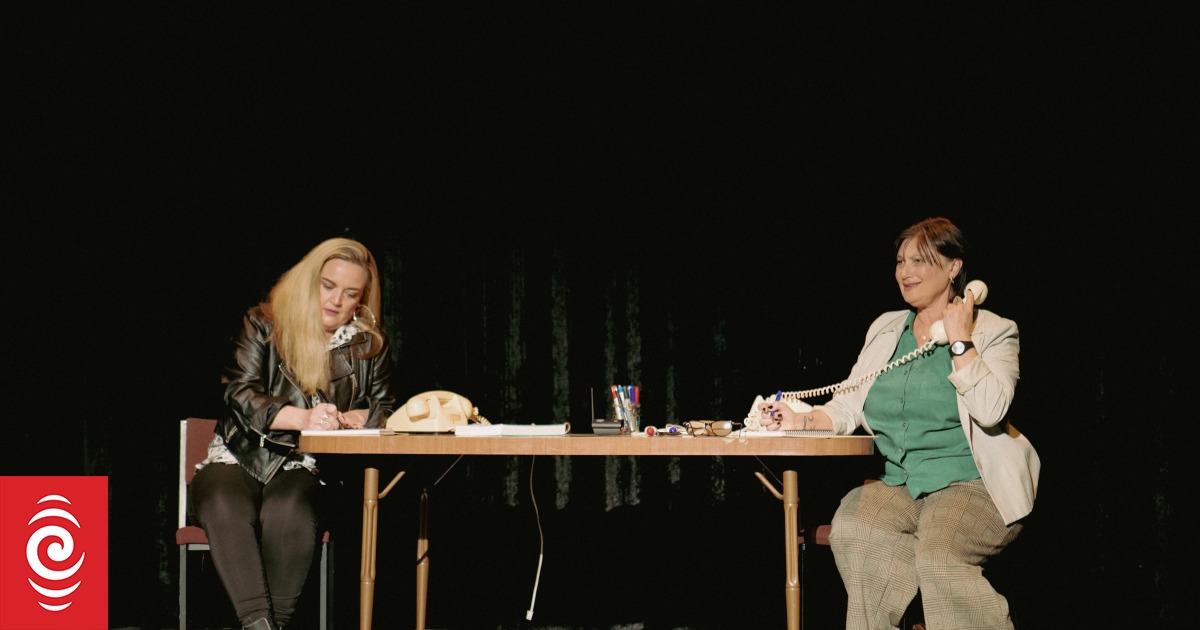
Angela Nicol and Dianne Thomas star in Piss Off Peri.
Photo: supplied
Celvin Teixeira, 50, was one of a handful of men who found themselves at a play about menopause on Saturday night in Whangarei.
Teixeira’s partner Trish Hayward, 47, bought tickets to see Piss Off Peri at the Whangarei Fringe Festival to start a conversation with her partner about her symptoms of perimenopause, the hormone changes that lead into menopause. Those symptoms included a short temper and forgetfulness that initially had Hayward worried (anxiety is another common symptom of perimenopause) that she had early onset dementia
“I feel like I now have a better handle on it, which to be honest I hadn’t given it much thought,” said Teixeira, following the play.
“I find it difficult to talk about and I thought this would be an easy way to broach the subject,” added Hayward.
Piss Off Peri is a 45-minute play that follows two menopausal women who start a helpline for other women who have entered perimenopause or menopause. Much to the surprise of the play’s creators all three shows have sold out of the 150 available tickets and festival organisers are fielding enquiries for more tickets.
Menopause, sometimes referred to as “the Change,” marks the end of a woman’s reproductive years. Hot flushes, vaginal dryness, insomnia and depression are some of mostly-miserable side effects. Perimenopause leads into that transition when the body’s oestrogen levels drop. Symptoms of this phase include irregular periods, weight gain, facial hair growth and loss of sex drive, among others.

A scene from Piss Off Peri.
Photo: Serena Solomon/RNZ
Sandrine Le Gars, 43, attended the play with her friend Francoise Vaughan, 52, because the two had recently had a conversation about menopause. Vaughan has been through menopause and Le Gars sees herself on the cusp of perimenopause, something she doesn’t feel entirely ready for.
“If it was men [going through menopause] maybe it would be more talked about,” said Le Gars, with a glass of wine in hand following Piss Off Peri at the Octagon Theatre in Whangarei.
Vaughan remembered feeling “very anxious about [perimenopause and menopause]. I was scared. I didn’t know what was coming,” she said.
In the end she was one of the 20 percent of women who are spared any major symptoms other than a discontinued period.
Women sharing their thoughts and experiences of perimenopause and menopause is the main goal of 47-year-old Anna Moreton, the play’s director.

The play’s creators are, from left: Andi Podesta, Angela Nicol, Dianne Thomas and Anna Moreton.
Photo: Supplied
“I honestly thought I was getting dementia because all of a sudden I couldn’t’ find words,” she said of her perimenopause so far.
Moreton believes the conversation about menopause has shifted in the right direction with more women sharing their stories and more workplaces accommodating the sometimes-debilitating symptoms. However, that might not be the case for everyone, especially in smaller towns like Whangarei.
“This is bullshit. We would talk about this more… and then I wouldn’t have gone through all that anxiety I went through,” she said.
She includes her story as well as real life stories of other women in calls that come through to the helpline in the play. It’s a mostly comedic look at the sometimes stranger-than-fiction symptoms and includes a peri-inspired dance and song (both very funny).
The story takes a few serious twists, all nods to the depression, suicidal thoughts or broken relationships this phase of life might trigger for women.
Piss Off Peri’s playwright, Andi Podesta, 54, also googled the symptoms of dementia before she investigated perimenopause for what she was experiencing.
“My face dropped” when Moreton suggested a play on menopause, said Podesta.
“It’s something that people don’t want to talk about so why would they want to see a play?” she added.
The first of the three performances to sell out includes a post-show discussion with Dr Melissa Gilbert, a local GP with an interest in menopause.
Dimitri Frost, 61, attended the play with his partner Kate Broughton. At 58, Broughton has been through menopause.
“It’s dear to my heart because what a f***ing rollercoaster it is,” she said.
As a man who journeyed through menopause with his partner, Frost had advice for younger men:
“It’s a good idea to enquire, get a sense of what is going on,” he said.
In other words, talk about it.




